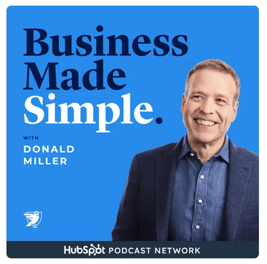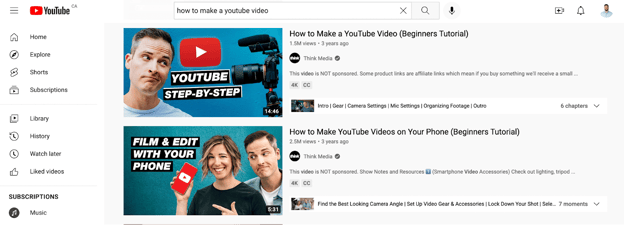What do Hunter S. Thompson and Taylor Swift have in common?
And more importantly, what do either of them have to do with B2B content marketing?
The similarity between these two pop culture icons is their approach to mastering their respective crafts.
Hunter S. Thompson, the author of Fear and Loathing in Las Vegas, was famously known for typing out every word of F. Scott Fitzgerald’s The Great Gatsby to “get the feeling of what it was like to write a masterpiece.”
Before her rise to international stardom, Taylor Swift mastered the art of singing and songwriting by performing covers of songs written by renowned artists that preceded her.
In essence, they both copied the work of people who came before them to shorten the timeline to mastery and develop the same understanding of their craft as the artists they most looked up to.
In the business world, you can take the same approach on your path to mastering B2B content marketing.
By stealing the strategies of the best B2B content marketers in the world, you too can get the feeling of what it’s like to build awareness and trust and guide your audience to purchase in the same way the greats do.
Before long, you’ll find you’ve absorbed their understanding of content marketing and will be able to build your own highly effective content marketing strategy without any outside help.
But all of that comes after the heist.
So, which B2B content marketing masters will we steal from first?
Keep reading to find out.
The goal of content marketing is to drive profitable customer acquisition.
Plain and simple, we want customers to make a purchase. That’s why we create content in the first place.
But how does content lead to a sale?
The secret is that your content must be valuable and relevant to your customers.
If you create valuable and relevant content and post it consistently, you’ll have the best chance of becoming a trusted source for your customers to find answers to their questions and solutions to their problems.
Once you’ve become a trusted source for your customers by speaking directly to their problems, it’s only a matter of time before your sales funnel will guide them to pay for your solution.
The first step to driving profitable customer action is to show up and be helpful.
So, how and where do you show up? And what type of content should you create?
When creating and distributing content, there are very few styles to choose from. You’ll likely create one of the following types of content:
- Audio
- Video
- Written
If you make audio content such as a podcast, you’ll distribute it on Spotify, iTunes, or Google Podcasts.
If you make video content, you’ll distribute it on YouTube or in shorter form on Instagram or TikTok.
If you make written content such as blog articles, you’ll distribute it through your company's blog, by guest posting for other people, or both.
That’s the B2B content marketing game.
You could, in theory, get started right away by creating your first video, blog post, or podcast episode, but I’m going to warn against that approach without looking at a few B2B content marketing examples first.
By looking at examples of excellent B2B content marketing and stealing the best parts of each strategy, you can cut down on time wasted running ineffective content marketing campaigns.
Stealing from the best will also accelerate your journey to B2B content marketing mastery and help you avoid some of the most common mistakes along the way.
Let’s get started.
Example #1: Donald Miller - Business Made Simple Podcast 
In his weekly podcast Business Made Simple, best-selling author Donald Miller speaks with business owners and entrepreneurs to help them improve the six essential components of their business: leadership, overhead, marketing, sales, products, and cash flow.
The reason this makes for such good content marketing is that it focuses entirely on solving the problems of the listeners.
Donald remains customer-focused every step of the way. He asks the right probing questions and, in each episode, provides specific and actionable advice for how his guest can improve their business.
What I like most about this approach is that it takes a 1:1 business coaching call, usually happening behind closed doors, and makes it freely available.
People are inherently drawn to listening to conversations that usually happen privately.
If you decide to start a podcast as part of your content marketing strategy, it’s worth asking if this is an approach you can steal for yourself.
Do you do 1:1 client work or strategic coaching calls?
Could you record some of those conversations for a podcast episode or series?
Not only is this a great approach because it puts your customers front and center it’s also a great way for potential clients (listeners) to see how you work and decide if your approach is one that would work for them and their business goals.
If the idea of starting a podcast does not excite you, there are other options to consider as part of your content marketing strategy.
Example #2: Think Media - Build Influence, Income, and Impact with Online Video
For years, Think Media has been dominating the YouTube landscape with its video content.
The focus of Think Media is to help businesses and entrepreneurs build influence, income, and impact through online video.
YouTube is the second most popular search engine in the world and is one of the primary places your customers go to search for answers to their questions and solutions to their problems.
This makes it a great place to deploy your content marketing efforts.
In a nutshell, the Think Media strategy is to research the questions their customers type into YouTube and make videos that answer them.
The acronym Think Media uses for this content marketing strategy is ASQ which stands for answer specific questions.
Here’s an example of how this might play out.
A viewer goes to YouTube and types “how to make a youtube video” because that’s what they’re trying to figure out.

In this example, two of the top four ranking videos for the search term “how to make a youtube video” are owned by Think Media.
This is how they build awareness, they show up where their audience is asking specific questions and consistently provide them with helpful answers.

Over time, the relationship is deepened by creating even MORE helpful content. The next time the viewer goes to YouTube with a question, maybe this time it’s about video editing software, guess who shows up?

The more times you can assist your audience in a moment when they’re trying to figure something out, the better. This will help you be seen as a trusted and credible source in your specific niche.
Profitable customer action happens when you provide an enticing call to action in the form of a product or service, and your customer decides to make a purchase.
After all, you’ve already provided so much value to them for free, so they’ll trust that your paid content is even more valuable, which it should be.
It’s important to know that the viewer might not take action until the tenth or twentieth time watching one of these videos, if ever.
But that’s how the content marketing game is played – show up, be helpful and be clear about how the customer can take the next step toward making a purchase.
The part of the strategy you can steal is in the types of questions you’re qualified to answer.
Ask yourself:
- What questions do my customers have?
- Are there any videos answering those questions?
- Even if there are, can you answer the questions better, faster, or more effectively?
Then go and make those helpful videos. Post as often as possible within reason, and you’ve got yourself a content marketing strategy.
If having your face or voice on video is not your cup of tea, then you'll love the final content marketing example, writing.
Example #3: Neil Patel - Write Articles That Rank
Neil Patel’s approach to content marketing is a favorite for anyone who doesn’t want to have their face seen on video or their voice heard on a podcast.
For years, Neil has taught entrepreneurs and business owners how to dominate the search engine optimization (SEO) game and write blog articles that rank on Google.
The approach Neil takes in serving his audience is the same as Donald Miller and Think Media which is to say he writes helpful content that answers the specific questions his target audience has.
The reason he’s so successful is that he writes articles that are clear, compelling, concise, confident, and clickable.
He is also a master of getting his articles to rank in Google, something he can teach you if you want to learn more about SEO.
Just to give you a few more B2B content marketing examples, here are some of the articles Neil has written over the years:
- How to Rank a Blog in Google’s Top 10 Search Results
- 7 Proven Strategies to Increase Your Blog’s Traffic by 206%
- Content Strategy: What Is It & How to Develop One [2022]
With this approach, you too can write helpful articles that your customer’s questions and help you build awareness, trust, and credibility in your industry.
All you need to do is choose which content style is right for you, audio, video, or written, and then start creating.
An Invitation to Steal Our Best Content Marketing Strategies
At Lean Labs, we don’t simply create content marketing assets for the fun of it, we make sure we can tie our content creation to the overall goal of driving profitable customer action.
It doesn’t matter if you’re Hunter S. Thompson, Taylor Swift, or an executive-level marketer trying to master their craft, it is always helpful to read the words, sing the songs, and execute the same content marketing strategies as the people who have successfully done it before you.
If you’d like to steal our best strategies and see exactly how we build traffic, get customers into our sales pipeline, nurture the relationship and guide them to a sale, please download our free Growth Playbook.
Tags:
Growth MarketingFeb 27, 2023




Comments